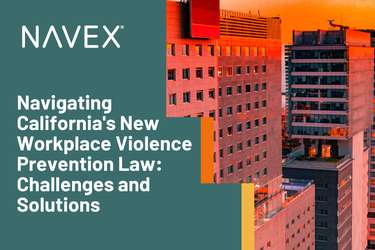While naysayers believe the Department Of Justice's (DOJ’s) memo is going to result in major complications and headaches for companies experiencing government investigations, ethical companies are unlikely to be affected much at all.
The DOJ made waves in the compliance world earlier this month when it issued a policy memo, Individual Accountability for Corporate Wrongdoing, detailing its new six-pronged approach to corporate investigations and prosecutions. In its announcement, the DOJ essentially said if companies under investigation want consideration for cooperating with the government, they will be required to hand over all the facts gathered from their internal investigations—including the names of all individuals involved, regardless of their status.
The memo left some legal experts scratching their heads. For example, in a recent Compliance Week article, some white-collar defense attorneys pointed to a range of potential negative consequences.
Yet, it seems possible that many E&C professionals and corporate investigators are more likely to read the policy memo and think, “This makes sense to me.”
After all, the whole point of E&C efforts is to minimize—and ideally eliminate—violations of policy and the law. Companies truly committed to this goal will already be trying to identify wrongdoers. If employees have acted in a way that would cause the DOJ to sue or prosecute them individually, ethical companies will have little reason to protect them—and likely will have already fired them anyway.
DOJ Makes Bold Move for Positive Change
Under the current system, government investigations often result in big dollar penalties, but no charges against individuals. In such cases, the government gets its money and can claim it’s been tough on wrongdoing; the shareholders are content because the damage is manageable and short lived; and the individual wrongdoers (including corporate executives who may have known of the behaviors but did not act to prevent them) get to keep their jobs.
While the current system basically keeps everyone involved happy, it does not sufficiently disincentivize violating the law for corporate gain—and corporate wrongdoing persists. But the new policy suggests that the DOJ recognizes more is needed to truly alter the behaviors of the wrongdoers and to more effectively combat corporate malfeasance. The new policy also appears to be a response to the ongoing criticism that the DOJ and SEC merely go after headline-generating financial penalties but leave offending corporate leaders in place.
Good Corporate Citizens Need Not Worry
Some defense attorneys suggest that the new DOJ policy will result in “a tremendous chilling effect” on companies and their internal investigations. But is this really true?
Think about it: For there to be a chilling effect (for companies to perceive a conflict between sharing internally developed evidence and the corporate good), companies would have to want to protect wrongdoers from government lawsuits. As a result, the “chilling effect” will only impact those companies that either have evidence of wrongdoing by individuals or expect that they will uncover it as part of an investigation—and they also would be inclined to shield those who may have violated the law from government action.
On the other hand, if organizations do not feel the need to protect wrongdoers, then they will be comfortable sharing internally developed evidence with the government either (a) so that appropriate legal action can be taken against the individuals involved (which is both the right thing to do and reinforces that the company takes violations of the law seriously) or (b) to show that no one actually violated the law.
In other words, organizations with cultures of ethics and compliance have little to be concerned about with regard to the new policy.
Ethical organizations jump into action when problems arise — investigating wrongdoing and those responsible for it and, when the misconduct is serious, removing proven wrongdoers from the organization. These companies know that if wrongdoing goes unpunished internally, it not only raises the risk of the misconduct reoccurring, but it also implicitly sends the message to the rest of the organization that the company tolerates bad behavior. For them, acting promptly and effectively against wrongdoers is essential to reinforcing a culture of doing the right thing.
“Organizations with cultures of ethics and compliance have little to be concerned about with regard to the new policy.”
Arguably, an organization might be reluctant to share internal evidence when the evidence is inconclusive but indicates, to some degree, that a senior leader may have violated the law. In such cases, the organization may want to shield the individual from the cost—and the organization from the disruption—that a government lawsuit would entail. In the past, companies were not always required to share all internal evidence on individual actors in order to get cooperation credit. Now they will be.
But even in these circumstances, it would seem that full cooperation with the government is in an ethical organization’s overall, long-term best interest. Not only will they get cooperation credit, but the threat of facing government action gives senior leaders an even greater incentive to make sure their behavior fully complies with policy and the law—exactly the behaviors an ethical organization wants.
And if an executive balks at joining a company that might turn over evidence of potential wrongdoing, the executive is implicitly stating that he or she may take actions that could violate the law. Is this really a leader a company should want? If so, is it putting short-term profits ahead of doing the right thing?
A Practical Result of the DOJ Changes
In many ways, the issue boils down to defining the organization’s interests. The “chilling effect” argument suggests that the organization’s interests are represented by the interests of the leaders who might, theoretically, be implicated in wrongdoing and thus be subject to personal civil lawsuits or criminal prosecution. But they shouldn’t be. While some senior leaders may view the company’s interests and their individual interests as one and the same thing, the interests of the company are, in fact quite distinct. The stakeholders of most organizations are much broader than just senior leaders and executives, including, at a minimum, shareholders and employees.
For years, the debate has been brewing around who within organizations should “own” E&C responsibilities. Oftentimes those responsibilities land in the general counsel’s office. But many believe E&C should be removed from that reporting line so that an internal corporate investigator or compliance professional can independently assess the facts during internal investigations—without potentially feeling pressure to develop findings that will help protect the organization from liability. Because the interests of the organization are distinct from those of leaders who may wish to steer an investigation’s findings so that they are less harmful.
Final Takeaways
The implications of the DOJ memo may, ultimately, cause organizations to restructure the way they conduct and oversee internal investigations of alleged serious misconduct. The DOJ’s new policy may help organizations — including their boards of directors—to focus more acutely on ensuring that the camaraderie among senior leaders does not influence the outcome of an investigation or lead to efforts to protect those involved in (or even aware of) serious violations of policy or of the law.
In other words, the new DOJ may prompt some companies to ensure that their corporate investigators are truly neutral and acting on behalf of the company, not just some of its leaders.
For some organizations, the path to investigatory independence will be to restructure to whom their internal investigators report—and maybe to establish board oversight of any investigation involving allegations of serious violations of the law.
While the naysayers believe the DOJ’s memo is going to result in major complications and headaches for companies experiencing government investigations, the reality is, ethical companies are unlikely to be affected much at all. Indeed, for those focused on protecting an organization by preventing violations of the law by its employees, the DOJ’s new policy is likely to be viewed as a positive step toward effecting real change and combating corporate wrongdoing more successfully.







